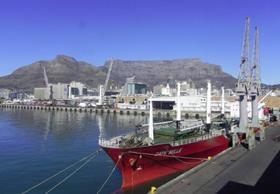
The first Seatrade specialised reefer vessel of the season to the US leaves Cape Town for Philadelphia this weekend. The vessel, Cape Belle, is the first in a series of 12 vessels destines to carry South African citrus fruit to the USA this year.
Anton du Preez, chief executive of South African shipping company Anlin Shipping, the Seatrade partner in South Africa, said his company was pleased to be involved with the citrus industry shipments to the US for the second year in a row.
'Our clients were impressed with last years shipping programme, particularly because we could offer vessels that ideally fitted the volumes that needed to be shipped,' he said.
'With Anlin here in South Africa, Seatrade has a strong local team who has been involved with conventional shipping from South Africa for some 13 years. We know the product and the growers and know what is critical for a successful export initiative.'
Last year the Anlin-Seatrade partnership ousted Cape Reefers who had been running the shipping programme for the best part of the past decade. Dealing with the Cape citrus growers is tough, because despite the good track record last year, they had to re-apply for the contract. Industry sources say the service levels and competitive rates swung this year's deal the Anlin-Seatrade way.
The shipping plan to the US makes provision for loading some 36,000 pallets between now and October for the US market.
Du Preez said each vessel would carry technicians on board to ensure that nothing goes wrong with the 24-day compulsory cold sterilisation programme required by the US Department of Agriculture.
'We are flexible in the sizes of the vessels we provide and the industry can use bigger vessels when it suits them in order to further reduce shipping rates.'
Citrus sources say they have managed to keep shipping rates at the same level for three years in a row. This is something that will make shippers to other destinations green with envy which have been faced with fairly steep increases over this period. Sources also say there are increasing discussions amongst exporters who are looking to pooling their volumes to effect lower shipping rates to Europe by switching certain products back from containers to the specialised conventional reefers.
The Anlin-Seatrade partnership seems to be positioning itself to do exactly that and has recently introduced a bi-weekly service to Russia. South Africa’s fresh fruit exports to Russia are rapidly growing, driven by increased consumer spending in the country. Until now most of the citrus fruit shipped there was done by the importers themselves who almost exclusively used the Baltic Line vessels.
Mr Du Preez said the Seatrade service to St Petersburg had been introduced based on the demand from exporters.
Most of the vessels in the Baltic Lines fleet are old and marine insurance experts say the present a huge risk to exporters. A more secure and reliable shipping service is therefore expected to boost the fresh produce trade between South Africa and Russia.
Leading growers who are part of the export alliance to the US confirmed that they have privately talked to other growers and exporters to ‘test the water' in order to pool their volumes for conventional shipments to Western Europe.
'The USA experience has showed us that we can offer customers fresh shipments every 10 days at lower freight rates. If we can do it there, why not also to Europe?' they commented.
While the requirements of the US programme and the cost of compliance is so high that it really forced the growers and exporters to work together on a joint logistics and shipping programme, the reality is that to the rest of the world, 80 per cent of South Africa's fresh fruit exports are shipped in containers. To turn that around will be a massive task.



